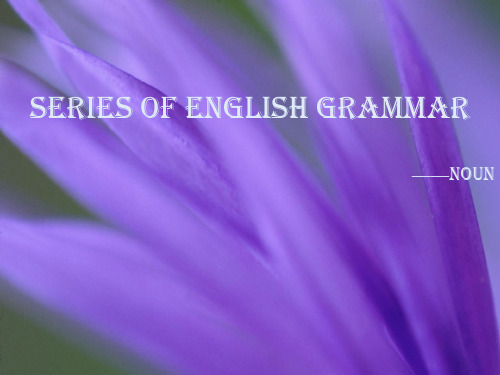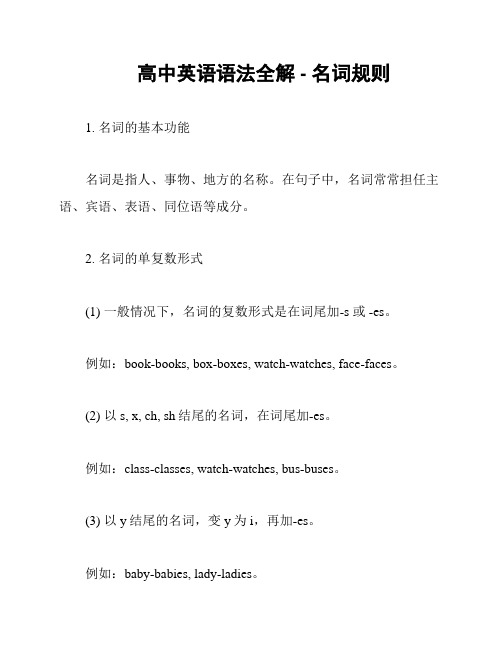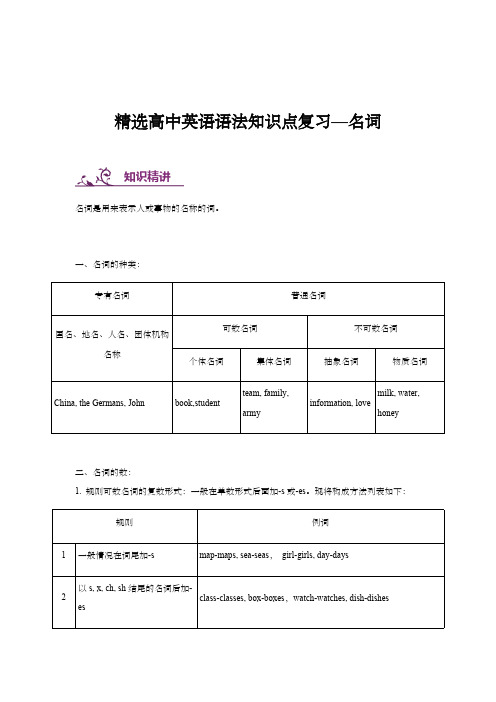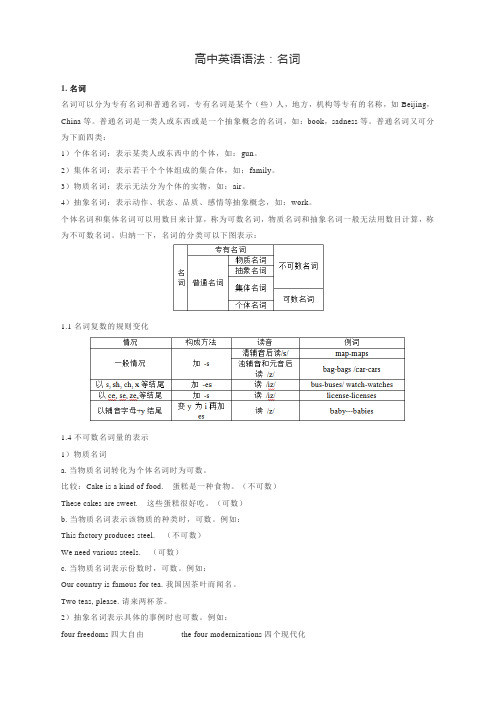高中英语语法-名词
高中英语语法-名词

表示地名的专有名词
Asia 亚洲 China 中国 Beijing 北京
表示人的专有名词
Yao Ming 姚明 Newton 牛顿 Beckham 贝克汉姆
表示机构的专有名词
the United Nations 联合国
Tsinghua University 清华大学
普通名词 (Common Nouns) 1. Individual Nouns:
Nouns) 不可数名词
(Uncountable Nouns)
一. 规则变化
1. 一般在词尾加-s
清辅音后读/s/,浊辅音后读/z/。
book->books cup->cups bed->beds bag->bags hour->hours house->houses horse ->horses
指作为个体而存在的人或东西
car 汽车 fan 风扇
photo 照片 tree树
book 书
apple 苹果
stick 木棍 stamp 邮票
*
6
普通名词 (Common Nouns)
2. Collective Nou群
family 家庭 team 团队
( 零蛋火山和宣言, 两种形式均存在。)
一. 规则变化
6. 以th结尾的词,在词尾 加“s”: mouth mouths path paths death deaths month months
( 零蛋火山和宣言, 两种形式均存在。)
二.不规则变化
1: 变内部元音 (oo-ee; a-e) man-men tooth-teeth foot-feet goose-geese policeman -policemen saleswoman-saleswomen
高中英语语法全解 - 名词规则

高中英语语法全解 - 名词规则1. 名词的基本功能名词是指人、事物、地方的名称。
在句子中,名词常常担任主语、宾语、表语、同位语等成分。
2. 名词的单复数形式(1) 一般情况下,名词的复数形式是在词尾加-s 或 -es。
例如:book-books, box-boxes, watch-watches, face-faces。
(2) 以s, x, ch, sh结尾的名词,在词尾加-es。
例如:class-classes, watch-watches, bus-buses。
(3) 以y结尾的名词,变y为i,再加-es。
例如:baby-babies, lady-ladies。
(4) 以-f 或 -fe结尾的名词,改-f 或-fe为-ves。
例如:life-lives, knife-knives。
(5) 不规则变化。
例如:man-men, woman-women, child-children。
3. 名词的所有格形式(1) 一般情况下,名词所有格在词尾加-’s。
例如:Tom’s book, the cat’s tail。
(2) 如果该名词已经以-s结尾,只需在其词尾加-’即可。
例如:the students’ books。
(3) 如果该名词以-s结尾,但又有多个名词,并且这些名词都共同拥有同一个东西,只需在其词尾加-’。
例如:The workers’ union。
(4) 如果名词是以不发音的-s结尾的复数名词,只需在其词尾加-’即可。
例如:The Joneses' house。
以上是名词的规则,希望能帮助到您。
高中英语语法—名 词

The news is very exciting. (这个消息令人兴奋)
、glasses, shoes, socks, trousers, gloves等名词往往用复数形式,故谓语用复数。 如:The trousers are very cheap and I want to take them.(裤子很便宜,我想买) 6、a lot of 后跟名词复数时谓语用复数形式,跟不可数名词时谓语用单数形式。 如:A lot of students are playing baseball now.(现在有许多学生在打垒球) A lot of time was wasted on that work.(大量的时间花在了那个工作上)(被动句) 7、and 连接两个名词做主语时,谓语原则上用复数,但是两个名词若构成一个整体事物时,谓语则用单
如:
The Shanghai Television Festival will be held next month.(上海电视节将在下个月举行) Sunday is a holiday and most people do not work.(星期天是个假日,多数人不工作)
What are you going to do during the summer vacation/holidays?(在暑期你打算做什么事情? )
③以辅音字母+y结尾的名词,变y为i,再加es。 如:family—families city—cities party—parties country—countries strawberry—strawberries [注]:以元音字母+y结尾的名词,直接在词尾+s。 如:boy-boys holiday-holidays bay-bays ④以f或fe结尾的名词,变f或fe为v,再加es。(ves读音为 |vz| ) 如:shelf—shelves wolf—wolves life—lives knife—knives wnife-wnives thief-thieves
高中英语语法-名词

名词就是表示人,事物,地点或抽象概念的名称的词 1. 专有名词
抽象名词: 表示动作、状态、
品质、感情等抽象概念,如: work
不可数名词
2.普通名词
物质名词: 表示无法分为个体
的实物,如:air
集体名词: 表示若干个个体组成
的集合体,如:family
可数名词
个体名词: 表示某类人或东西
中的个体,如:gun
名词的格
二、另外一种所有格是由介词of加名词构成的名词短语 of 所有格多用于无生命的东西 the leg of the table, a map of China
但有些表示时间、距离等无生命和表示世界、国家、城 镇等的名词,也可以在词尾加’s或“ ’ ”,变成相应 的所有格 five minutes‟ walk today‟s newspaper
名词的格
6)作为一个整体的词组,在最后一个词的词尾加’s 。 an hour and a half‟s walk
7)不定代词后接 else , 所有格放在 else 上。 somebody else‟s bag 8)起修饰作用的名词,如不表示所有关系,通常不用 ’s。 room number, tooth brush
名词的格
3) 在表示店铺或教堂的名字或某人的家时,名词所有 格的后面常常省略它所修饰的名词: the barber's, my aunt‟s 4) 如果两个名词并列,并且分别有's,则表示"分别有 ";只有一个's,则表示'共有': John„s and Mary‟s rooms(两间) John and Mary's room(一间) 5) 复合名词或短语,„s 加在最后一个词的词尾: a month or two's holiday
精选高中英语语法知识点复习—名词(解析版)

只修饰不可数名词
much, a little, a bit of, a great/good deal of, a great/large/small amount of
既可修饰可数名词又可修饰不可 the, one's, some, any, no, all, a lot of, lots of, plenty of, a large quantity
以辅音字母加 y 结尾的名词,
4
party-parties, family-families, story-stories, city-cities
变 y 为 i 加-es
以元音字母加 y 结尾的名词,
5
toy-toys, boy-boys,day-days, ray-rays, Henry-Henrys
es
变-f 和-fe 为 v 再 leaf-leaves, thief-thieves, knife-knives, wife-wives,wolf-wolves,
以-f 或-fe 加-es 3
结尾的词
half-halves
加-s
chief-chiefs, proof-proofs, roof-roofs
以元音字母加-o 结尾的名词加
7
radio-radios, bamboo-bamboos, zoo-zoos
-s
8 以-th 结尾的名词加-s
trut month-months, path-paths
2. 不规则可数名词复数:
改变名词中的元音字母或
1
man-men, woman-women, foot-feet, goose-geese, mouse-mice
或专有名词以 y 结尾的,加-s
高中英语语法:名词

高中英语语法:名词1. 名词名词可以分为专有名词和普通名词,专有名词是某个(些)人,地方,机构等专有的名称,如Beijing,China等。
普通名词是一类人或东西或是一个抽象概念的名词,如:book,sadness等。
普通名词又可分为下面四类:1)个体名词:表示某类人或东西中的个体,如:gun。
2)集体名词:表示若干个个体组成的集合体,如:family。
3)物质名词:表示无法分为个体的实物,如:air。
4)抽象名词:表示动作、状态、品质、感情等抽象概念,如:work。
个体名词和集体名词可以用数目来计算,称为可数名词,物质名词和抽象名词一般无法用数目计算,称为不可数名词。
归纳一下,名词的分类可以下图表示:1.1 名词复数的规则变化1.4 不可数名词量的表示1)物质名词a. 当物质名词转化为个体名词时为可数。
比较:Cake is a kind of food.蛋糕是一种食物。
(不可数)These cakes are sweet.这些蛋糕很好吃。
(可数)b. 当物质名词表示该物质的种类时,可数。
例如:This factory produces steel.(不可数)We need various steels.(可数)c. 当物质名词表示份数时,可数。
例如:Our country is famous for tea. 我国因茶叶而闻名。
Two teas, please. 请来两杯茶。
2)抽象名词表示具体的事例时也可数。
例如:four freedoms 四大自由the four modernizations四个现代化物质名词和抽象名词可以借助单位词表一定的数量,如a glass of water 一杯水/ a piece of advice一则建议。
5. 定语名词的复数名词作定语一般用单数,但也有以下例外。
1) 用复数作定语。
例如:sports meeting 运动会students reading-room 学生阅览室talks table 谈判桌the foreign languages department 外语系2)man, woman, gentleman等作定语时,其单复数以所修饰的名词的单复数而定。
名词-高中英语语法记忆框架版(精编)

名词一、名词的分类名词可分为普通名词和专有名词两大类。
其中专有名词指具体的人物、地点、机构、国家或地区的名称等,不能随便更改。
普通名词则较为复杂,它分为可数名词和不可数名词两类。
二.名词分可数名词与不可数名词1.可数名词变复数sight (视力) —sights (名胜);water (水)— waters (水域);custom (习惯) —customs (海关);spirit (精神) —spirits (情绪);2.不可数名词量的表示Cake is a kind of food. 不可数当物质名词转化为个体名词时为可数。
These cakes are sweet. 可数当物质名词表示该物质的种类时,可数。
This factory produces steel. UN.物质名词We need various steels. CN.抽象名词表示具体的事例时也可数。
a success, a surprise物质名词和抽象名词可以借助单位词表一定的数量,a glass of water 一杯水a piece of advice一则建议用复数形式,表示各种各样的:fruits各种水果,foods各种食物,equipments各种器材,设备,waters水域,gases各种气体,teas各种茶抽象名词有些物质名词和抽象名词的复数形式表示特殊的含义:time 时间→times 时代,次数,倍数,look 看→looks 外貌,green 绿色→greens 青菜,brain 脑→brains 头脑,脑筋,good 益处→goods 货物,sand 沙→sands 沙滩,沙漠有些名词根据含义不同,可用作可数名词,也可用作不可数名词。
hair 全部头发(不可数); a few white hairs 几根白头发(可数)help 帮助(不可数); 帮手,助手(可数) experience 经验(不可数);经历(可数) work 工作(不可数); 作品,著作(可数) paper 纸(不可数); 文件,论文,试卷(可数)surprise 惊讶(不可数);令人惊奇的事情(可数)三.名词作定语四. 不同国籍人的单复数五.名词的所有格②表示工业、工厂、机器、大学的名词后加“’s”the machine’s design Harvard’s Linguistics Department③其他一般用名词+of +名词the top of tower;the legs of the table④介词to表示所有格the key to the lock;the answer to the question; the entrance to the cinema the solution to the problem对某一名词同时使用“-'s”和“of…”来表达拥有或所有的方式叫做双重所有格双重所有格three, nine……同一个名词前,冠词(a,an,the ),指示代词(this,that,these,those),物主代词(my,your,his等),以及不定代词(no,every,each等)不能重复使用,如果要表示此种意思,就要借助于双重所有格a friend of mine (√) my a friend (X)It’s no fault of yours. (√) It’s no your fault. (X)this naughty daughter of the Greens’ (√)the Greens’ this naughty daughter(X)六.Y esterday a boy came to see you. 主语Edison was a world famous inventor. 表语Would you like some bananas?宾语名词的句法功能We chose him monitor of our class. 宾语补足语They will meet at the school gate. 定语The new film will last two hours. 状语Mr. smith,my first teacher,left yesterday. 同位语七.名词类别的转用the +普通名词→抽象名词I saw the mother in her when she said that. =motherhooda +专有名词→普通名词Is there a Mr.Chen in your school? 专有名词转用为普通名词专有名词+(e)s→普通名词I hope there will be many Edisons among you.…the +专有名词(表达比喻)→普通名词Shanghai is the New York of China. the New York =the biggest city like New York in the U.S.表示种类Oolong is a green tea, very popular in Taiwan.表示非材料Tom hit the dog with a stone. stone是weapon物质名词转用为普通名词指由该物质制成的物品These glasses are made in Italy.玻璃杯其他Two hot coffees and two black teas, please. 省略单位名称的表达法抽象名词转用为普通名词(抽象名词具体化) danger, success, failure, life, concern,surprise, honor', pity, beauty, death, attraction, comfort, help,knowledge, atmosphere, pleasure, shame, wonder, worry……In war, a soldier’s life is full of danger. The man is a danger to societyHe takes pride in his son. He is a pride to his parents.。
高中英语语法名词__冠词__代词

I.名词的定义名词是表示人、事物、地点或抽象概念的名称。
如:desk time life book room honesty worker pencil computer Ⅱ.名词的分类1.名词分为专有名词和普通名词:.专有名词:表示具体的人、事物、地点或机构的专有名称。
如:Asia;Washington,English,the United Nations, WTO, WHO.2. 普通名词:表示某些人、某类事物、某种物质或抽象概念的名称。
如:teacher;tea, peace, weapon(武器)。
普通名词又可进一步分为四类:1)个体名称:表示单个的人和事物。
horse , car, room ( 房间 ), apple, fan 风扇 picture.2)集体名称:表示一群人或一些事物的名称。
people (人们) family army team, group3)物质名词:表示物质或不具备确定形状和大小的个体的物质。
steel;air, water ,milk, ink, gold, sugar.4)抽象名词:表示动作、状态、品质或其他抽象概念。
.health, life, friendship, patience2.名词又可分为可数名词和不可数名词。
可数名词: 有单、复数之分,表示一个或多个。
a book一本书;two books两本书。
不可数名词:抽象名词、物质名词和专有名词一般不可数。
有少数名词既可作可数名词,也可作不可数名词,但含义不同。
paper纸 a paper 报纸 glass 玻璃 a glass 玻璃杯;wood 木头 woods 树林 iron 铁 an iron 熨斗room 空间 a room 房间 chiken 鸡肉 a chicken 小鸡lamb羊肉 a lamb 羊 work 工作 a work 著作/工艺品youth青春 a youth (男)青年 relation 关系 a relation 亲属power 威力/电力a power大国 beauty 美 a beauty 美人/美的东西fire 火 a fire 炉火 hair 总称头发 a hair 一根头发water 水 waters 水 sand 沙 sands 沙滩light 光lights 灯光 kindness 好意 kindnesses 几件好事knowledge知识 a good knowledge of English精通英语custom 风俗 customs 海关 spirit 精神 spirits 酒精,情绪time 时间times 时代 tea 茶 a well-known tea 一种名茶pleasure 高兴 a pleasure 高兴的事Ⅲ.名词的数1.不可数名词1)不可数名词一般没有单、复数之分,包括专有名词、物质名词和抽象名词。
- 1、下载文档前请自行甄别文档内容的完整性,平台不提供额外的编辑、内容补充、找答案等附加服务。
- 2、"仅部分预览"的文档,不可在线预览部分如存在完整性等问题,可反馈申请退款(可完整预览的文档不适用该条件!)。
- 3、如文档侵犯您的权益,请联系客服反馈,我们会尽快为您处理(人工客服工作时间:9:00-18:30)。
名词一、名词的分类:名词分为专有名词和普通名词。
1、专有名词:主要指人名,地方,机构或者某类人或者事物的名称。
如:China, Li lei,Beijing; Americans; English; May; New Year’s Day 注意:专有名词的第一个字母要大写2、普通名词:是一类人或东西或是一个抽象概念的名词,如:book,sadness1). Individual Nouns: 指作为个体而存在的人或东西可以指具体的人或物。
Eg: aunts; a panda; apartments也可指抽象东西。
Eg: a year; fairy tales; a dream2.)Collective Nouns: 表示若干个个体组成的集合体Eg: army; audience; crew; family; team; police; government; public个体名词和集体名词可以用数目来计算,称为可数名词(Countable Nouns),物质名词和抽象名词一般无法用数目计算,称为不可数名词(Uncountable Nouns)。
常见的不可数名词:advice, baggage, change(零钱), furniture, hair, homework, information, knowledge, luggage, money, news, progress, traffic ,housework, equipment ,absence, age, anger, courage, energy, equipment, experience, failure, fear, food, fun, health, ice, industry, kindness, labor, luck, marriage, music, nature, paper, peace, pleasure, power, pride, rain, research, respect, safety, salt, sand, silence, sleep, strength, snow, technology, time, trade, transport, travel, trust, truth, waste, water, wealth, weather, wind, work(工作)最常见的不可数名词A. Abstract 抽象名词advice 建议age 年老beauty 美丽capitalism 资本主义communism 共产主义democracy 民主energy 能源fun 乐趣happiness 幸福help 帮助honesty 诚实information 信息justice 正义kindness 善knowledge 知识laughter 笑声liberty 自由life 生命、生物、活力play 玩recreation娱乐strength 实力trouble 麻烦truth 真理virtue 美德wisdom 智慧work 工作youth 青年B. Matter, material 物质名词air 空气beer 啤酒blood 血液bread 面包butter 黄油cake 蛋糕chalk 粉笔cheese 奶酪coal 煤coffee 咖啡electricity 电力fog 雾fish 鱼gold 黄金grass 草hair 头发ice 冰ink 油墨iron 铁juice 果汁lumber 木材meat 肉milk 牛奶oil 油oxygen 氧气paper 纸rain 雨rice 水稻smoke 烟雾snow 雪soap 肥皂soup 汤sugar 糖tea 茶water 水wine 葡萄酒wood 木C. Generic terms 属类business 商业change 零钱equipment 设备fruit 水果furniture 家具jewelry 珠宝luggage 行李machinery 机械mail 邮件money 金钱news 新闻propaganda 宣传scenery 风景slang 俚语stationery 文具traffic 交通vegetation 植被weather 天气D. Subject matter 学科architecture 建筑art 艺术chemistry 化学civics 市政学economics 经济学engineering 工程English 英语geology 地质学grammar 语法history 历史literature 文学mathematics 数学music 音乐philosophy 哲学physics 物理学science 科学technology 技术vocabulary 词汇E. Sports and recreation 运动和休闲baseball 棒球basketball 篮球bridge 桥牌camping 露营dancing 跳舞drinking 饮酒football 足球golf 高尔夫hiking 远足hockey 曲棍球homework 家庭作业hunting 狩猎opera 歌剧sailing 帆船singing 歌唱softball 垒球swimming 游泳television 电视traveling 旅行volleyball 排球F. Countable and non-countable nouns 一词多意要具体对待age 年老/年龄baseball (and other balls) 棒球(运动)/(一个)棒球(和其他球)beer (and other drinks) 啤酒(物质)/(一杯)啤酒(和其他饮料)business 商业/公司change 找零/变改company 陪伴/公司dope 毒品/傻瓜glass 玻璃/玻璃杯、眼镜iron 铁/熨斗paper 纸/文件play 玩耍/戏剧room 空间/房间smoke 烟雾/香烟tape 胶带(材料)/胶带物体)tea 茶叶/下午茶work 工作/著作youth 青春/青年人3). Material Nouns: 指无法分为个体的物质。
Eg: beer; cake; cloth; cotton; detergent; fur; ice; paint; paper; soil一般来说,物质名词是不可数的,因而没有复数形式。
注意:有些物质名词可用作可数名词,表示“一份”、“一杯”、“一种”Eg: Two strong black coffees, please. ( 两份) Three beers, please. (三杯) It was a special tea. (一种)个别物质名词的复数形式可以表示特别的意义。
Eg: rains (雨季)sands (沙滩)snows (积雪) waters(海域)…4).Abstract Nouns:表示动作、状态、品质、感情等抽象概念Eg: education; love; policy; trust; health ,happiness, nature; fashion; relief; silence; truth,etc.多数情况下,这种名词常用于单数形式,不加任何冠词。
Eg: He’s learning French for fun. I wish you good luck.抽象名词转化为可数名词。
Failure is the mother of success. (失败与成功在此为抽象概念)As a teacher , she is a success, but as a mother, she is a failure because she devotes little time to looking after her child. (成功者,失败者,可数)二、名词的数不可数名词一般没有单复数之分例如:health, advice, glass, wood, English, America,不可数名词作主语,谓语动词须用单数形式。
可数名词有单、复数之分。
可数名词的复数形式有以下几种:注意:1. stomach – stomachs (胃)2. 以元音+y或以专有名词+y结尾的名词,直接在词尾加-s. Eg: boys; toys; Henrys,days, storeys , monkeys, holidays3. 以-o 结尾的名词+ es在课本中出现的有hero, potato, tomato;negro(黑人)读z其余以-o结尾的词+ s: (photo, piano, radio, bamboo ,zoo,kilo, studio(工作室) ,video(录像室)…读z)注意:zero ,volcano(火山),+es / s 均可以。
不规则变化:变内部元音:foot-feet, tooth-teeth,goose-geese ,mouse-mice, man-men, woman-women, policeman-policemen,gentleman officials- gentlemen officials词尾加-en或ren:ox-oxen, child-children ouse – ice:mouse-mice; louse-lice(虱子)有些外来词的不规则复数形式:Eg:analys i s-analys e s; bas i s-bas e s;thes i s-thes e s; cris i s-cris e scriteri on-criteri a;phenomen on-phenomen a;medi um-medi a单复数相同的情况:sheep; deer; means(方式,方法,手段); fish; works(工厂;著作,作品); species(种类); Chinese; Japanese, china(瓷器,不可数,要用a piece of china) 以及由汉语音译表示度量衡、货币等单位的名词。
Eg: yuan, jiao, fen, jin, muWork:*.表示“工作”时,为不可数名词。
如:Steve has finally found a job. 史蒂夫最后找到一份工作。
Gifts performed most of the tasks.姑娘们负责干大部分工作。
*..若表示文学家、艺术家、音乐家等的“作品”“著作”等,则单复数一样。
Do you like The Complete Works of Shakespeare?Two pieces of works*.. 表示“工厂”时,无论是单数还是复数,均要用works;用作主语时,其谓语动词需根据具体语境来确定。
